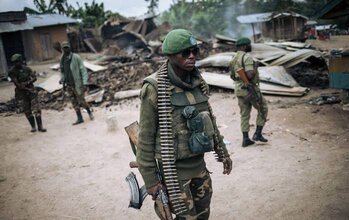By Helen C. Epstein
In 2003, three American college friends set out for Uganda. As they traveled through the north of the country, they were so moved by the suffering caused by the conflict between the government and the warlord Joseph Kony that they started an NGO called Invisible Children to spread awareness about the crisis and raise money for relief projects. Their work eventually drew the attention of Shannon Sedgwick Davis, a young Texas lawyer and CEO of the Bridgeway Foundation, the philanthropic arm of Bridgeway Capital Management, a multibillion-dollar hedge fund with investments in oil, pharmaceuticals, and consumer products. For years, Davis had been troubled by the limitations of charity, which she likened to “putting Band-Aids on bullet holes.” In January 2009, she was nursing her 1-month-old second child when she read a report from Human Rights Watch, a Bridgeway grantee, about a series of massacres committed by Kony’s forces. Having fled Uganda, they’d stormed through a cluster of hamlets in neighboring Democratic Republic of Congo, abducting children and killing their parents. Davis was so outraged that she resolved to seek a new approach to Bridgeway’s work. Documenting atrocities would no longer be enough. The foundation would now endeavor to stop them, militarily.
Davis funded Invisible Children to lobby the Obama administration to pass the 2010 Lord’s Resistance Army Disarmament and Northern Uganda Recovery Act, which called for the development of a military strategy to end the crisis. She then flew to Uganda and persuaded the country’s senior military commanders to host a contingent of US Special Forces troops to help them track Kony down. After Invisible Children’s YouTube video “KONY 2012”—in which cofounder Jason Russell explains why Americans need to take a stand against Kony—was retweeted by Rihanna, Oprah, and other stars and watched by over 100 million people in six days, Congress swiftly passed a series of bills that allocated more funding to the joint US-Uganda mission to kill or capture Kony.
That mission failed, and after the Pentagon had spent more than $780 million on it, President Donald Trump quietly shut it down in 2017. But now the Bridgeway Foundation appears to be luring the Biden administration into another, far more dangerous Central African venture on the basis of evidence that may have been extracted under torture, or at least the threat of it. As the Kony mission was winding down, Laren Poole, one of Invisible Children’s founders and now chief operations officer of Bridgeway Foundation, formed a relationship with officers from Uganda’s security forces who’d been warning for years that a Congo-based rebel group known as the Allied Democratic Forces, or ADF, received weapons and training from radical Islamist groups and was planning to turn a swath of central Africa into a caliphate.
Scholars who have studied Congo’s enormously complex violence have long been skeptical about Uganda’s claims, but in March, Bridgeway’s Poole, in collaboration with researchers from George Washington University’s Program on Extremism, released “The Islamic State in Congo,” a report claiming that the ADF has aligned itself ideologically with the Islamic State and was receiving material assistance from the group. Later that month, Secretary of State Antony Blinken designated the ADF—or ISIS-DRC, as the State Department calls it—a Foreign Terrorist Organization. The label opens up Pentagon funding lines that could be used to train and equip the Congolese military to fight the rebels. US troops, recently deployed to help the Mozambican army go after rebels allegedly linked to the IS, could be pulled in to pursue the ADF as well.
Most of the new information in the Bridgeway/George Washington University report is based on interviews carried out by Bridgeway staff and Ugandan officials with alleged ADF members. But Ugandan security forces are notorious for kidnapping and torturing Ugandans, including opposition supporters, writers, and even a legislator. For years, a unit within Uganda’s Chieftancy of Military Intelligence known as the Joint Anti-Terrorism Task Force—whose director appears to be involved in Bridgeway’s research—has also been kidnapping and torturing Ugandan Muslims and forcing them to confess to belonging to the ADF. Why is Bridgeway, a foundation that claims to be working to end crimes against humanity, involved with one of Africa’s most ruthless security agencies? And is the Pentagon preparing to inflame yet another dangerous foreign quagmire on highly dubious grounds, even as it tries to extricate itself from Iraq and Afghanistan?
This article was first published by The Nation.







